United Nations Women's Guild Vienna 联合国维也纳妇女协会
THE UNITED NATIONS 联合国简介

the General Assembly
THE UNITED NATIONS
HISTORY
STRUCTURE
MEMBERSHIP
LANGUAGE
the General Assembly
-Deliberative assembly of all UN member states
THE UNITED NATIONS may resolve non-compulsory recommendations to states or suggestions to the UNSC decides on the admission of new members, following proposal by the UNSC adopts the budget HISTORY STRUCTURE MEMBERSHIP LANGUAGE elects the non-permanent members of the UNSC, all members of ECOSOC, the UN Secretary General following proposal by the UNSC, and the 15 judges of the ICJ Each country has one vote.
THE UNITED NATIONS
HISTORY
STRUCTURE
MEMBERSHIP
LANGUAGE
the Economic and Social Council - For global economical and social affairs responsible for co-operation between states on economic and social fields 文本 co-ordinates co-operation between the 文本 Official languages numerous specialized agencies of the UN
维也纳国际条约法公约英文

Vienna International Treaty Law ConventionIntroductionThe Vienna International Treaty Law Convention is a significant agreement that governs the formation, interpretation, and termination of treaties between different nations. This convention, also known as the Vienna Convention on the Law of Treaties, was adopted on May 23, 1969, and entered into force on January 27, 1980. It has become the cornerstone of international treaty law, providing a framework for the development of coherent treaty practice globally.Purpose of the ConventionThe primary objective of the Vienna International Treaty Law Convention is to codify and clarify the rules and principles related to treaties.It aims to promote stable and peaceful international relations by ensuring uniformity and predictability in treaty obligations. The convention seeks to eliminate uncertainties and disputes arising from treaty interpretation and application, thus strengthening the integrity and effectiveness of treaties.Key Principles1. Pacta Sunt Servanda – Treaties Must be HonoredParties to a treaty are obligated to fulfill their treaty obligations in good faith. The principle of pacta sunt servanda emphasizes the binding nature of treaties and requires states to comply with the agreements they have voluntarily entered into. This principle is crucial in maintaining trust and reliability among nations.2. Consent of StatesTreaties are binding only on the states that have consented to be bound by them. The consent may be expressed through signature, ratification, acceptance, or approval, depending on each state’s constitutional requirements. States are not bound by a treaty unless and until they have expressed their consent to be bound.3. Treaties and Third PartiesThe Vienna Convention recognizes the rights and obligations of third-party states in relation to treaties. Third-party states may acquire rights or assume obligations under a treaty if it is intended for their benefit or if they have consented to be bound by it. However, their consent is required explicitly or implicitly.4. Invalidity and Termination of TreatiesThe convention provides for circumstances in which a treaty may be considered invalid or terminated. Invalidity may arise due to a breachof a fundamental rule of international law, coercion, or corruption. Termination can occur through agreement, a material breach of the treaty, supervening impossibility of performance, or by the emergence of a new customary rule.Formation of Treaties1. NegotiationTreaties are typically negotiated between states, either directly or through authorized representatives. The negotiations involve draftingthe treaty text, exchanging views, and reaching a mutual understanding regarding the intended obligations and commitments of the parties involved.2. Consent and SignatureOnce the negotiations are complete, the treaty is open for signature by the states involved. Signing the treaty indicates a state’s willingness to continue the treaty process and consider becoming a party to the agreement. It does not, however, establish a binding obligation, as consent to be bound is typically expressed through subsequent actions.3. Ratification and Entry into ForceAfter signature, states may need to seek internal approval through their legislative or constitutional processes. This approval is known as ratification. Upon ratification, a state becomes a party to the treaty, and it is considered binding under international law. The treaty enters into force once a predetermined number of states have ratified.Interpretation of TreatiesThe Vienna Convention provides guidelines for the interpretation of treaty provisions to ensure a consistent and uniform approach among states. The principle of good faith plays a crucial role in treaty interpretation. Key methods of interpretation include:1.Textual Interpretation: The primary focus is on the ordinarymeaning of the treaty’s text.2.Contextual Interpretation: The treaty is interpreted in light ofits purpose, preamble, and any relevant agreements or subsequentpractice.3.Teleological Interpretation: The treaty’s interpretation isaligned with its intended objectives and purposes.4.Supplementary Means of Interpretation: Additional means, such asdrafting history and subsequent agreements, may be used tointerpret treaty provisions.Reservations and AmendmentsThe Vienna Convention allows for reservations and amendments to treaties under specific conditions. Reservations are unilateral statements made by states when signing, ratifying, or acceding to a treaty. Reservations can be restrictive, limiting a state’s obligations, or interpretative,clarifying the state’s understanding of a treaty provision. Amendments modify treaty provisions and require the consent of the parties involved.Dispute Settlement1. Negotiation and ConsultationStates are encouraged to settle disputes arising from treaty interpretation or application through negotiation or consultation. Diplomatic channels, such as direct dialogue or third-party mediation, help parties resolve their differences amicably. This approach promotes peaceful resolution and retains the spirit of cooperation among nations.2. Arbitration and AdjudicationIf negotiation or consultation fails to resolve the dispute, parties may consider resorting to arbitration or adjudication. The consent of the parties involved is required for these methods. International courts or tribunals, such as the International Court of Justice, play a vital role in settling treaty-related disputes and ensuring the impartial interpretation and application of treaty law.3. State Responsibility for BreachThe Vienna Convention addresses the consequences of a state breachingits treaty obligations. A state breaching its obligations may be held accountable for violating international law. The injured state may seek remedies such as cessation of the breach, compensation, or satisfaction. The convention establishes principles to determine the state’s responsibility for its wrongful acts.ConclusionThe Vienna International Treaty Law Convention has played a crucial role in shaping the global treaty practice. It provides a comprehensive framework for the formation, interpretation, and termination of treaties, ensuring stability, predictability, and fairness in international relations. The principles and guidelines outlined in the convention havefostered cooperation and facilitated the resolution of treaty-related disputes. As nations continue to engage in treaty-making, the Vienna Convention continues to serve as the foundation for harmonizing treaty law worldwide.。
国际组织机构名称简介(NATO, EU, IMF, APEC, OPEC, ASEAN,UNESCO, UNICEF)

3. IMF
International Monetary Fund 国际货币基金组织
10. UNESCO
United Nations Educational,Scientific and Cultural Organization 联合国教科文组织 a specialized agency of the UN established on 16 November, 1945 Members: 193 Member States and 6 Associate Members Purpose: to contribute to peace and security by promoting international cooperation in the fields of education, science, culture and communication. Headquarters: Paris
7. APEC
21 members, referred to as “Member Economies”:
Australia Brunei
Canada
China
Hong Kong,China Indonesia
Japan
South Korea
Malaysia,
Mexico New Zealand,
ASEAN was founded in August 1967 by Malaysia, Thailand, Indonesia, Singapore, and the Philippines.
联合国组织结构图

IFAD International Fund for
Agricultural Development
CTBTO 6 PrepCom for the
NOTES: Solid lines from a Principal Organ indicate a direct reporting relationship; dashes indicate a non-subsidiary relationship.
Agency
UPU Universal Postal Union WMO World Meteorological
Organization
UNODC United Nations Office on
DSS Department of Safety and
Security
WIPO World Intellectual Property
The United Nations System
Principal Organs
Trusteeship Council
Subsidiary Bodies
Military Staff Committee Standing Committee and ad hoc bodies Peacekeeping Operations and Missions International Criminal Tribunal for the former Yugoslavia (ICTY) International Criminal Tribunal for Rwanda (ICTR)
OIOS Office of Internal Oversight
常用机构英文缩写

常用机构英文缩写UN the United Nations 联合国UNSG United Nations Secretary General联合国秘书长CUN The Charter of the United Nations联合国宪章UNAIDS Joint United Nations Programme on HIV/AIDS 联合国艾滋病规划署UNDP United nations Development programme 联合国开发计划署UNEP United Nations Environment Programme联合国环境署UNSC United Nations Security Council 联合国安全理事会UNCF United Nations Children's Fund 联合国儿童基金会UNCA TD United nations conference on trade and development联合国贸易和发展大会CSD Commission on Sustainable Development 联合国可持续发展委员会UNCED United Nations Conference on Environment and Development联合国环境与发展大会UNESCO Unitde Nations Education ,Scientific and Culutral Organization 联合国教科文组织FAO Food and Agriculture Organization of the United Nations 联合国粮农组织UNIDO United Nations Industrial Development Organization联合国工业发展组织UNFPA United Nations Fund for Population Activities联合国人口活动基金WFUNA World Federation of United Nations Associations 联合国协会世界联合会UNECE United Nations Economic Commission for Europe联合国欧洲经济委员会UNOG United Nations Office in Geneva联合国日内瓦办事处UNSF United Nations Special Fund联合国特别基金UNCDF United Nations Capital Development Fund联合国资本开发基金会UNCITRAL United Nations Commission on International Trade Law联合国国际贸易法委员会UNSF United Nations Security Force 联合国和平军队WHO World Health Organization 世界卫生组织WMO World Meteorological Organization 世界气象组织WEO World Environmental Organization世界环境组织WEO World Energy Outlook:世界能源展望WTO World Trade Organization 世界贸易组织WTO World Toilet Organisation世界厕所组织WTO World Telecommunications Organization世界电信组织WIPO World Intellectual Property Organization 世界知识产权组织WPC World Peace Council 世界和平理事会WAIPA World Association of Investment Promotion Agencies世界投资促进机构协会WCED World Commission on Environment and Development世界环境与发展委员会WCO World Customs Organization世界海关组织WEF World Education Fellowship:世界教育联谊会WB World Bank世界银行ACWW Associated Country Women of the World世界农村妇女协会ITC International Trade Center世界贸易中心IMF International Monetary Fund 国际货币基金组织ICRC International Committee of the Red Cross 国际红十字会ISO International Standards Organization 国际标准化组织ITU International Telecommunication Union 国际电信联盟ICAO International Civil A viation Organization 国际民用航空组织IDA International Development Association 国际开发协会IAEA International Atomic Energy Agency 国际原子能机构IOC International Olympic Committee 国际奥委会IOJ International Organization of Journalists 国际新闻工作者协会ILO International Labour Organization 国际劳工组织IFC International Finance Corporation 国际金融公司IMO International Maritime Organization 国际海事组织IFAD International Fund for Agricultural Development 国际农业发展基金会ICC International Chamber of Commerce国际商会UEA Universal Esperanto Association国际世界语协会INTELSAT International telecommunications Satellitic国际通信卫星机构IRTO International Radio and Television Organization国际广播电视组织IEC International Electrotechnical Commission 国际电工委员会IOCU International Organization of Consumers Unions 国际消费者联盟组织CPWC Co-operation Programme on Water and Climate国际气候及水合作计划组织IAAF International Association of Athletics Federations国际田联EU European Union 欧洲联盟CIS Common Wealth of Independent States 独立国家联合体EEC European Economic Community 欧洲经济共同体NA TO North Atlantic Treaty Organization 北大西洋公约组织APEC the Asia—Pacific Economic Cooperation 亚太经合组织ASEAN Association of Southeast Asian Nations 东南亚国家联盟OSCE Organization for Security and Cooperation in Europe 欧洲安全与合作组织EEC Organization for European Economic Cooperation 欧洲经济合作组织IPU Inter—Parliamentary Union 各国议会联盟UPU Universal Postal Union 万国邮政联盟OAU Organization of African Unity 非洲统一组织PLO Palestine Liberation Organization 巴勒斯坦解放组织OIC Organization of the Islamic Conference 伊斯兰会议组织OPEC Organization of Petroleum Exporting Countries 石油输出国组织NAM the Non—Aligned Movement 不结盟运动GCC Gulf Cooperation Council 海湾合作委员会APG Asia/Pacific Group 亚太组织ABC Agriculture Bank of China 中国农业银行ICBC Industry and Commercial Bank of China 中国工商银行BC Bank of China 中国银行PBOC The People's Bank of China 中国人民银行ED Education Department 教育署PLA People’s Liberation Army 中国人民解放军FBI Federal Bureau of investigation 美国联邦调查局HKSAR Hong Kong Special Administrative Region 香港特别行政区NBA National Basketball Association 美国国家篮球协会RCS Red Cross Society 红十字会UPS United Parcel Service 全球特快专递USMC United States Military Company 海军陆战队NASA National Aeronautics and Space Administration美国航天太空总署FDA Food and Drug Administration美国食品药物管理局USDA United States Department of Agriculture美国农业部IRS Internal Revenue Service美国税务局NAACP National Association for the Advancement of Color People 全国黑人权益促进会AARP American Association of Retired People美国退休人员协会AAUP American Association of University Professors 美国大学教授协会CIA Central Intelligence Agence 美国中央情报局FBI Federal Bureau of Investigation联邦调查局DC Washington D .C 华盛顿特区NY New Y ork 纽约SFC San Francisco City 三藩市(美国)ABS:American Bureau of Shipping 美国船运局ACC:American Chamber of Commerce 美国商会(又简称Amcham)A.E.A:American Economic Association 美国经济协会AGM:annual general meeting(公司股东)年度大会AID:Agency for International Development(美国)国际开发署AMA:American Management Association 美国管理协会ASA:American Standards Association 美国标准协会Amex:American Stock Exchange 美国证券交易所CFTC Commodity Futures Trading Commission期货交易管理委员会EPA Environmental Protection Agency联邦环境保护局。
常见国际组织的中英文及缩写

常见国际组织的中英文及缩写欧盟 European Union — EU 欧元 (euro)阿盟阿拉伯国家联盟 League of Arab States — LAS非洲联盟(African Union — AU,简称“非盟”)东南亚国家联盟(简称东盟,Association of Southeast Asian Nations —ASEAN 北大西洋公约组织(North Atlantic Treaty Organization — NATO ),简称北约1949年4月4日,美国、加拿大、英国、法国、比利时、荷兰、卢森堡、丹麦、挪威、冰岛、葡萄牙和意大利等12国在美国首都华盛顿签订了北大西洋公约,宣布成立北大西洋公约组织(North Atlantic Treaty Organization —NATO ),简称北约。
大赦国际 (Amnesty International — AI)英联邦 (The Commonwealth)不结盟运动(Non-Aligned Movement — NAM)巴黎俱乐部 (Paris Club) 也称“十国集团” (Group-10)南方中心(South Centre)是以促进南南合作为宗旨的国际著名政府间组织和智库,其前身是南方委员会。
南方委员会为第三世界国家政界、外交界、经济界和学术界著名人士组成的国际性组织。
1985年由委内瑞拉前总统佩雷斯建议,1986年5月在吉隆坡第二次南南会议决定建立,同年9月宣布正式成立,1994年9月正式改名为南方中心。
总部设在日内瓦,现有包括中国在内的51个成员。
独联体是独立国家联合体 (Commonwealth of Independent States — CIS) 的简称上海合作组织 (Shanghai Cooperation Organization — SCO)阿拉伯各国议会联盟 (Arab Inter-Parliamentary Union — AIPU)阿拉伯国家联盟 (League of Arab States — LAS,简称“阿盟”)西欧联盟 (Western European Union — WEU) 1955年5月6日成立,前身为布鲁塞尔条约组织,拥有比利时、法国、德国、希腊、意大利、卢森堡、荷兰、葡萄牙、西班牙和英国10个正式成员国。
科索沃的独立宣言“ (2008年)

召开一次特别会议上,2008年2月17日,在普里什蒂纳的科索沃的资本,回答人民的号召,建立一个社会人的尊严,荣誉,并申明其公民的自豪和目的,致力于和解和宽恕的精神,在面对最近的痛苦遗产,致力于保护,促进和表彰我国人民的多样性,重申我们的愿望成为民主国家的欧洲- 大西洋家庭完全集成的,观察,科索沃是一个特例,从产生的南斯拉夫的非自愿分手,是不是其他任何情况的先例,回顾多年的冲突和在科索沃的暴力行为,扰乱了所有文明的人的良心,感谢,在1999年的世界进行干预,从而消除贝尔格莱德对科索沃的治理,并置于联合国科索沃临时行政当局,自豪,科索沃以来开发的功能,多种族的民主制度,自由表达我国公民的意愿,回顾多年来,贝尔格莱德和普里什蒂纳之间的国际赞助我们未来的政治地位问题的谈判,遗憾的是没有相互可以接受的状态的结果是可能的,尽管我们的领导人的善意参与,确认联合国特使马尔蒂·阿赫蒂萨里的建议,为未来的发展提供了全面的框架科索沃和欧洲最高标准的人权和良好治理,决心要看到解决的地位,为了给自己的未来,我们的人民清晰度,超越过去的冲突和实现我们社会的民主潜力,Honouring所有的男性和女性谁作出了巨大牺牲,为科索沃建立一个更美好的未来,1。
我们,我们人民的民选领导人,现宣布科索沃是一个独立的主权国家。
这一声明反映了我国人民的意志,它是完全按照联合国特使马尔蒂·阿赫蒂萨里和他对解决科索沃地位问题的综合建议,建议。
2。
我们宣布科索沃是一个民主,世俗和多民族共和国,非歧视和平等的法律保护的原则指导下。
我们应当保护和促进科索沃所有社区的权利,并创造条件,为他们有效地参与政治和决策过程中所必需的。
3。
我们接受科索沃充分阿赫蒂萨里计划中所载的义务,并欢迎提出的框架,以指导今后几年的科索沃。
我们将实施在那些通过优先采用包括在其附件XII,特别是那些保护和促进社区及其成员的权利的立法,包括义务。
4。
我们应当采取尽快宪法,供奉着我们的承诺,尊重人权和基本自由的全体公民,特别是通过“欧洲人权公约”的定义。
UnitedNations联合国英文简介

United NationsThe United Nations UN is an intergovernmental organization established on 24 October 1945 to promote international co-operation. A replacement for the ineffective League of Nations, the organization was created following the Second World War to prevent another such conflict. At its founding, the UN had 51 member states; there are now 193.The UN Headquartersis situated inManhattan, New York City and enjoys extraterritoriality. Further main offices are situated in Geneva, Nairobi and Vienna. The organization is financed by assessed and voluntary contributions from its member states.Its objectives includemaintaining international peace and security,promoting human rights,fostering social and economic development,protecting the environment,providing humanitarian aid in cases of famine, natural disaster, and armed conflict.联合国之宗旨为:一、维持国际和平及安全;并为此目的:采取有效集体办法,以防止且消除对于和平之威胁,制止侵略行为或其他和平之破坏;并以和平方法且依正义及国际法之原则,调整或解决足以破坏和平之国际争端或情势;二、发展国际间以尊重人民平等权利及自决原则为根据之友好关系,并采取其他适当办法,以增强普遍和平;三、促成国际合作,以解决国际间属于经济、社会、文化及人类福利性质之国际问题,且不分种族、性别、语言或宗教,增进并激励对于全体人类之人权及基本自由之尊重;四、构成一协调各国行动之中心,以达成上述共同目的;一、本组织系基于各会员国主权平等之原则;二、各会员国应一秉善意,履行其依本宪章所担负之义务,以保证全体会员国由加入本组织而发生之权益;三、各会员国应以和平方法解决其国际争端,俾免危及国际和平、安全及正义;四、各会员国在其国际关系上不得使用威胁或武力,或以与联合国宗旨不符之任何其他方法,侵害任何会员国或国家之领土完整或政治独立;五、各会员国对于联合国依本宪章规定而采取之行动,应尽力予以协助,联合国对于任何国家正在采取防止或执行行动时,各会员国对该国不得给予协助;六、本组织在维持国际和平及安全之必要范围内,应保证非联合国会员国遵行上述原则;七、本宪章不得认为授权联合国干涉在本质上属于任何国家国内管辖之事件,且并不要求会员国将该项事件依本宪章提请解决;但此项原则不妨碍第七章内执行办法之适用;The UN has six principal organs:the General Assembly the main deliberative assembly;the Security Council for deciding certain resolutions for peace and security; the Economic and Social CouncilECOSOC for promoting international economic and social co-operation and development;the Secretariat for providing studies, information, and facilities needed by the UN; the International Court of Justice the primary judicial organ;the United Nations Trusteeship Council inactive since 1994.UN System agencies include the World Bank Group, the World Health Organization, the World Food Programme, UNESCO, and UNICEF.The UN's most prominent officer is the Secretary-General, an office held by South Korean Ban Ki-moon since 2007. Non-governmental organizations may be granted consultative status with ECOSOC and other agencies to participate in the UN's work.大会、安全理事会、经济及社会理事会、托管理事会、国际法院、及秘书处;Four of the five principal organs are located at the main UN Headquarters in New York City.The International Court of Justice is located in The Hague海牙The six official languages of the United Nations, used in intergovernmental meetings and documents, are Arabic, Chinese, English, French, Russian, and Spanish.联合国英文缩写:UN是一个由主权国家组成的国际组织,致力于促进各国在国际法、国际安全、经济发展、社会进步、人权、公民自由、政治自由、民主及实现持久方面的合作;联合国成立于结束后的1945年,用以取代,去阻止战争并为各国提供对话平台;联合国下设了许多附属机构以实现其宗旨;到2012年为止,联合国共,包括除以外所有得到的不包括、、、、等;在联合国遍及世界的办事处中,联合国及其专门机构通过全年举行定期会议来决定实体和行政议题;联合国由六大主要机构组成:主要的、以决定对和平与安全的某些决议、以协助促进国际经济和社会的合作和发展、为联合国提供所需的研究、资讯和设施、主要的司法机构以及当前不活跃;其他重要的还有、和;联合国的行政首长是,当前由担任;联合国的经费由会员国分摊和自愿捐赠;联合国有6种官方语文,分别为:、、、、、;背景和建立在联合国建立的之前一个世纪,为了规制国家之间的冲突,许多国际协约组织和会议被建立起来,例如和;在的惨痛损失之后,宣布建立以保证国家间的和谐相处;这一组织解决了一些领土争端,并在一些领域建立了国际架构,例如邮政、航空、鸦片控制等,其中一些后来被吸纳进了联合国的体系中;然而国际联盟对于殖民地当时占世界人口的一半的代表权不够,并且诸如美国、苏联、德国和日本在内的列强参与度亦不足;它没能阻止1931年日本对满洲的入侵,1935年的,1937年,德国在领导下的扩张,以及最终导致的;创立一个新的世界性组织的最初完整构想可以追溯至1939年的;美国总统首先使用了“联合国”一词,用于描述;1942年1月1日,26国政府签订,联合国一词得到首次正式使用;1945年4月25日,在旧金山召开,50国政府及诸多非政府机构参与并起草了;1945年10月24日,当时的安理会五大常任理事国法国、中华民国、苏联、英国和美国及多数其他签署国46国共同批准了宪章,联合国正式宣告成立;1946年1月6日,联合国大会第一次会议51个国家代表出席以及安理会在英国伦敦的举行;大会选定纽约作为,其设施于1952年完工;联合国总部同联合国在、和的总部一样,被指定为国际领土;同时,大会还选举了挪威外相为第一任联合国秘书长联合国大会是联合国的主要合议性团体,包括,每年定期举行会议,但紧急会议亦可以召开;大会由一位由成员国中产生,根据区域进行轮换和21位副主席主持;第一次会议于1946年1月10日在伦敦西敏卫理公会中央礼堂召开,有51个国家的代表参会;大会对于重要问题的投票需要到场且投票的三分之二多数才能通过;重要问题的例子包括关于和平和安全的建议、主要机构的选举、接纳、暂停和开除会员,以及预算事宜;其他问题则由简单多数决定;每个国家只有一票;除预算事项外,通过的决议对于会员没有约束力;大会可以对联合国范围内的一切事项提出建议,但关于和平和安全的事项则属安全理事会考量;决议草案由八个委员会进行讨论之后交付大会审议;这八个委员会分别是:•总务委员会–监督委员会,由大会主席、副主席和委员会主席组成•全权证书委员会–负责确定各会员国代表的全权证书•第一委员会裁军与国际安全•第二委员会经济和金融•第三委员会社会、人道主义和文化•第四委员会特殊政治和非殖民化•第五委员会行政和预算•第六委员会法务安全理事会的职责是维护国家之间的和平与安全;联合国的其他主要机构只有对会员国提出“建议”的权利,而安理会则有权提出具有强制性的决议,在宪章第二十五条规定下,会员国必须接受并履行;安理会的决议被称为;安理会由15个会员国组成,其中包括5个常任理事国——中国、法国、俄罗斯、英国和美国——以及10个非常任理事国——阿根廷2014年任期结束、澳大利亚2014年、乍得2015年、智利2015年、约旦2015年、立陶宛2015年、卢森堡2015年、尼日利亚2015年、韩国2015年及卢旺达2015年;其中五个常任理事国对于联合国决议具有,因此常任理事国能够阻止一项决议的通过,但无法阻止讨论;十个非常任理事国任期两年,根据原则由大会从成员国中选出;安理会的主席每个月根据字母顺序进行轮换;联合国秘书处由主持,由来自全球的公务人员协助运作;它为联合国机构召开的会议提供研究、信息和设施,并根据安理会、大会、经社理事会和其他机构的指示进行工作;现任秘书长在事实上是联合国的发言人和领导人;根据联合国宪章,这一职位是这一组织的“行政首长”;宪章第九十九条规定秘书长可将“其认为可能威胁国际和平及安全之任何事件”提请安理会注意,之后的秘书长将之解读为为这一职位提供了在全球范围推动行动的机会;秘书长一职已经发展成为联合国管理者和会员国间争端及国际问题的调停者两项职责的结合;秘书长在安理会具有否决权进行推荐之后由大会进行任命;这一职责没有具体的要求,但如今已形成惯例应有一至两个五年任期,应根据地区轮转任命,且不应来自安理会五大常任理事国;现任秘书长为,他在2007年接替了,并在此后获得连任,将于2016年年底结束任期;国际法院ICJ位于荷兰海牙,是联合国的主要司法机构,于1945年根据联合国宪章建立起来,并在1946年作为的继承者开始运行;国际法院由15名法官组成,法官任期9年,由大会任命,必须来自不同的国家;国际法院的所在地是海牙的,与私立国际法研究中心共享一座建筑;它的主要目的是对国家之间的争端进行裁决;法院开庭审理过战争罪行、非法国家干涉、种族清洗以及其他一些事宜;其他联合国机构可以请求国际法院提供司法建议;联合国经济及社会理事会ECOSOC在推动国际经济和社会合作及发展方面对大会进行协助;经社理事会有54个成员国,由大会选出,任期三年;主席同样选举产生,任期一年,来自经社理事会中中等或较小的成员国;理事会每年7月召开一次会议,会议地点在纽约或是日内瓦;它的主要职责是收集信息、为会员国提供建议,与专门机构进行协调并提供建议;由于协调机构的职责较为宽泛,因此经社理事会时常被批评为不够集中及无关痛痒;经社理事会的下属机构包括联合国土著问题常设论坛为联合国机构就问题提供建议、联合国森林论坛协调和推广可持续森林管理、联合国统计委员会协调各机构间的信息收集以及可持续发展委员会协调联合国机构及非政府组织推动;经社理事会同时还为非政府组织提供顾问权,至2004年,已经有超过2,200个组织获得了顾问地位;联合国机构通过两种方式取得经费:成员国的与;联合国及其机构两年一度的来自各成员国的会费;联合国大会审查联合国的经费,并确定各国应付的会费款额;各国的会费主要是依照各国的经济实力以及其他一些因素来决定的;会费由经常性预算、维和费用和费用三部分组成;联合国的特别专案不在常规经费预算之内,这些专案是通过成员国的捐款来运作的;捐款的很大部分是为所需要国家提供农产品,但主要还是资金的支援;联合国大会确立的原则是,联合国不应该在经费上过度倚赖任何国家;为此每财政年度联合国的会费设有“封顶”价格,规定各成员国所付会费的最高价;2000年协定的部分规定,单个会员国的会费占经常性财政预算最高额度从原先的25%降低到22%,目前这是承担的经费额度,而其他所有成员国的会费则更低,下限为0.001%;联合国缴纳比例每三年修改一次,会费比额编制方法的制定依据支付能力、同时给予人均国民收入低的国家适当宽减的原则;2010年至2012年,每年的会费总额约25亿美元;联合国宪章第十九条规定:凡拖欠本组织财政款项之会员国,其拖欠数目如等于或超过前两年所应缴纳之数目时,即丧失其在大会投票权;大会如认拖欠原因,确由于该会员国无法控制之情形者,得准许该会员国投票;自联合国成立以来,一直是向联合国提供最多经费的国家,同时也是拖欠会费次数最多、金额最大的国家;近年来比较明显的变化有:的会费比额从2000年的%降为2013年的%;则从2000年的%上升为2013年的%2013年缴纳约1亿3119万美元;2011年11月1日,获准加入,作为对此事的“回应”,美国、中止向联合国教科文组织缴纳会费;2013年11月9日,美国、以色列等5个国家因为拖欠联合国教科文组织会费,丧失了在联合国教科文组织的投票权;军事制裁结束之后,联合国开始在国际安全、维持和平等方面扮演较为积极的角色;近年来维持和平任务简称“”的派遣频率以及规模不断突破历史新高,相关费用也已成为该组织财务支出的最大宗;然而受限于“国家”仍为国际舞台上最主要行为者的现实环境,联合国对于强国的行为仍无力约束,一些与强国利益没有直接相关的事务,也难以动员各国参与落实联合国的决议;例如:1990年代在,以及2007年南部发生的惨案,联合国均无法做出立即而有效的处置;2003年美国绕开联合国的议事程式,片面决定出兵攻打,严重威胁联合国权威,但是安理会只能事后追认;2006年军队进攻南部,原驻该地的未能发挥作用,安理会通过决议要求停火,亦未能立即落实;对于、、等国家进行试爆的行为,安理会均决议反对,但是、还是事实上拥有的国家;2009年以色列军队进攻地区,并攻击联合国该驻地设施与人员,安理会亦未能立即而有效的处置;否决权部分人士认为大国所拥有的有可能被滥用;例如在时期,和之间的政治冲突,以及近年来许多国际事件在欧美与中俄的立场迥异,动用否决权的使用上,即表现得十分明显;特别是在安理会中,五大享有的否决权,被美国和苏联多次运用;中华民国重返联合国问题主条目:关于重新加入联合国问题,不同政治立场人士对此存在争议,由于牵扯到复杂和争议的而无法取得共识;中华民国方面观点中华民国是一个实际主权独立的国家,且主权与治权从未及于台澎金马中华民国目前实际统治之领土,不能代表2300万人民,故而中华民国长年争取;中华人民共和国方面观点世界上只有,台湾是中国的一部分,中华民国已于1949年灭亡;中华人民共和国政府于1971年根据即取代中华民国在联合国的中国席位与一切权力,是代表中国的唯一合法政府,故中华人民共和国所行使之中国代表权自然包含台湾等地区,联合国不应允许中华民国返联;。
联合国组织机构架构图
UNESCO United Nations Educational, Scientific
and Cultural Organization
WHO World Health Organization World Bank Group
• IBRD International Bank for Reconstruction and Development • IDA International Development Association • IFC International Finance Corporation • MIGA Multilateral Investment Guarantee Agency • ICSID International Centre for Settlement of Investment Disputes
UNEP United Nations Environment Programme UNFPA United Nations Population Fund UN-HABITAT United Nations Human Settlements Programme UNHCR Office of the United Nations High Commissioner for Refugees UNICEF United Nations Children’s Fund
1
Security Council
Subsidiary Bodies
Counter-terrorism committees International Criminal Tribunal for Rwanda (ICTR) International Criminal Tribunal for the former Yugoslavia (ICTY) Military Staff Committee Peacekeeping operations and political missions Sanctions committees (ad hoc) Standing committees and ad hoc bodies
维也纳公约中英(繁体)(可编辑修改word版)
維也納條約法V i e nn a C o n v e n t i o n o n t h e 公約L a w o f T r e a t i e s一九六九年五月二十三日訂 Done at Vienna on 23 May 1969.於維也納Entered into force on 27 January 1980. UnitedNations, Treaty Series, vol. 1155, p. 331本公約各當事國,The States Parties to the present Convention,鑒於條約在國際關係歷史上 Considering the fundamental role of treaties in 之基本地位,the history of international relations,承認條約為國際法淵源之Recognizing the ever-increasing importance of一,且為各國間不分憲法及 treaties as a source of international law and as 社會制度發展和平合作之工 a means of developing peaceful cooperation among 具,其重要性日益增加,nations, whatever their constitutional and socialsystems,鑒悉自由同意與善意之原則 Noting that the principles of free consent and of 以及條約必須遵守規則乃舉 good faith and the pacta sunt servanda rule are 世所承認,universally recognized,確認凡關於條約之爭端與其 Affirming that disputes concerning treaties, like 他國際爭端同,皆應以和平 other international disputes, should be settled by 方法且依正義及國際法之原 peaceful means and in conformity with the則解決之,principles of justice and international law,念及聯合國人民同玆決心創 Recalling the determination of the peoples of the 造適當環境,俾克維持正義 United Nations to establish conditions under which 及尊重由條約而起之義務, justice and respect for the obligations arisingfrom treaties can be maintained,鑒及聯合國憲章所載之國際 Having in mind the principles of international law 法原則,諸如人民平等權利 embodied in the Charter of the United Nations, such 及自決,所有國家主權平等 as the principles of the equal rights and self- 及獨立,不干涉各國內政, determination of peoples, of the sovereign禁止使用威脅或武力以及普 equality and independence of all States, of non- 遍尊重與遵守全體人類之人 interference in the domestic affairs of States, of 權及基本自由等原則,the prohibition of the threat or use of force andof universal respect for, and observance of, humanrights and fundamental freedoms for all,深信本公約所達成之條約法 Believing that the codification and progressive 之編纂及逐漸發展可促進憲 development of the law of treaties achieved in the 章所楬櫫之聯合國宗旨,即 present Convention will promote the purposes of 維持國際和平及安全,發展 the United Nations set forth in the Charter,國際間之友好關係並達成其 namely, the maintenance of international peace and 彼此合作,security, the development of friendly relationsand the achievement of cooperation among nations,確認凡未經本公約各條規定 Affirming that the rules of customary之問題,將仍以國際習慣法 international law will continue to govern規則為準,questions not regulated by the provisions of thepresent Convention,爰議定條款如下:Have agreed as follows:第一編導言P A R T I.I N T R O D U C T I O N第一條本公約之範圍A r t i c l e1S c op e o f t h e p r e s e n t C o n v e n t i o n本公約適用於國家間之條約。
国际组织缩略词汇总(正式版) (2)

World Meteorological Organization
世界气象组织
IMO
International Maritime Organization
国际海事组织
WIPO
World Intellectual Property Organization
世界知识产权组织
IFAD
International Fund for Agricultural Development
联合国艾滋病规划署
UNITAR
The UN Institute for training and Research
联合国训练研究所
ILO
International Labour Organization
国际劳工组织
FAO
Food and Agriculture Organization
联合国粮食及农业组织
FEIAP
Federation of Engineering Institutions of Asia and the Pacific
亚太工程学会联合会
IAU
The International Astronomical Union
国际天文学联合会
IBRO
International BrainResearchOrganization
WBG
World Bank Group
世界银行集团
ICAO
International Civil Aviation Organization
国际民用航空组织
UPU
Universal Postal Union
万国邮政联盟
ITU
International Telecommunication Union
欧洲的性别平等与女权运动
欧洲的性别平等与女权运动近年来,性别平等和女权运动在全球范围内引起了广泛关注。
而在欧洲,这一议题更是成为社会发展的重要议题之一。
本文将从欧洲的性别平等现状、女权运动的历史背景、取得的成就以及未来的挑战等方面展开论述。
一、性别平等现状性别平等是欧洲社会面临的一个重要问题。
在法律、政策和社会习俗方面,欧洲许多国家已经取得了一定程度的性别平等。
例如,女性在就业和政治参与方面的地位逐渐提升,性别歧视现象逐渐减少。
然而,尽管取得了一定的进展,欧洲仍然面临一些挑战,如职场性别差异、家庭和职业生活的平衡问题等。
二、女权运动的历史女权运动在欧洲有着悠久的历史。
早在19世纪末和20世纪初,女性就开始要求获得与男性平等的权利。
其中,英国妇女社会与政治联盟(Women's Social and Political Union)等组织为争取妇女选举权进行了长期而艰苦的斗争。
随着时间的推移,其他欧洲国家也相继兴起了女权组织和运动。
这些运动不仅为女性争取了参政权,也推动了性别平等的进程。
三、取得的成就欧洲女权运动取得了众多的成就。
在政治领域,女性逐渐获得了更多的政治参与机会。
例如,在挪威和瑞典等国,女性在政府中占据了相当比例的席位。
在就业领域,性别平等政策的实施使得女性能够更好地平衡家庭和职业生活。
此外,性别暴力和性骚扰的问题也得到了更多的关注和重视。
四、未来的挑战尽管欧洲女权运动取得了许多成就,但仍面临一些挑战。
首先,职场性别差异仍然存在。
女性在晋升、薪资和职业选择等方面仍然相对不利。
其次,家庭和职业生活的平衡问题依然困扰着许多女性。
在社会习俗和文化观念中,仍存在对女性传统角色的期望和限制。
此外,性别暴力和性骚扰问题也需要更坚决的行动来解决。
总结欧洲的性别平等与女权运动成为推动社会进步的重要力量。
虽然已取得了一些成就,但仍面临许多挑战。
为了实现真正的性别平等,需要加强法律和政策的支持,改变社会观念,同时也需要全社会的共同努力。
名人演讲:希拉里在联合国第四届妇女大会上的演讲

名人演讲:希拉里在联合国第四届妇女大会上的演讲----WORD文档,下载后可编辑修改----下面是小编收集整理的范本,欢迎您借鉴参考阅读和下载,侵删。
您的努力学习是为了更美好的未来!名人演讲:希拉里在联合国第四届妇女大会上的演讲Mrs. Mongella, Under Secretary Kittani, distinguished delegates and guests:I would like to thank the Secretary General of the United Nations for inviting me to be a part of the United Nations Fourth World Conference of Women. This is truly a celebration -- a celebration of the contributions women make in every aspect of life: in the home, on the job, in their communities, as mothers, wives, sisters, daughters, learners, workers, citizens and leaders.It is also a coming together, much of the way women come together ever day in every country.We come together in fields and in factories. We come together in village markets and supermarkets. We come together in living rooms and board rooms.Whether it is while playing with our children in the park, or washing clothes in a river, or taking a break at the officewater cooler, we come together and talk about our aspirations and concern. And time and again, our talk turns to our children and our families. However different we may be, there is far more that unites us than divides us. We share a common future, and are here to find common ground so that we may help bring new dignity and respect to women and girls all over the world. By doing this, we bring new strength and stability to families as well.By gathering in Beijing, we are focusing world attention on issues that matter most in the lives of women and their families: access to education, health care, jobs and credit, the chance to enjoy basic legal and human rights and participate fully in the political life of their countries.There are some who question the reason for this conference.Let them listen to the voices of women in their homes, neighborhoods, and workplaces.There are some who wonder whether the lives of women and girls matter to economic and political progress around the globe.Let them look at the women gathered here and at Huairou -- the homemakers, nurses, teachers, lawyers, policymakers, and women who run their own businesses.It is conferences like this that compel governments and people everywhere to listen, look and face the world's most pressing problems.Wasn't it after the women's conference in Nairobi ten years ago that the world focused for the first time on the crisis of domestic violence?Earlier today, I participated in a World Health Organization forum, where government officials, NGOs, and individual citizens are working on ways to address the health problems of women and girls.Tomorrow, I will attend a gathering of the United Nations Development Fund for Women. There, the discussion will focus on local -- and highly successful -- programs that give hard-working women access to credit so they can improve their own lives and the lives of their families.What we are learning around the world is that if women are healthy and educated, their families will flourish. If women are free from violence, their families will flourish. If women have a chance to work and earn as full and equal partners in society, their families will flourish.And when families flourish, communities and nations will flourish.That is why every woman, every man, every child, every family, and every nation on our planet has a stake in the discussion that takes place here.Over the past 25 years, I have worked persistently on issues relating to women, children, and families. Over the past two-and-a half years, I have had the opportunity to learn more about the challenges facing women in my own country and around the world.I have met new mothers in Jojakarta and Indonesia, who come together regularly in their village to discuss nutrition, family planning, and baby care.I have met working parents in Denmark who talk about the comfort they feel in knowing that their children can be cared for in creative, safe, and nurturing after-school centers.I have met women in South Africa who helped lead the struggle to end apartheid and are now helping build a new democracy.I have met with the leading women of the Western Hemisphere who are working every day to promote literacy and better health care for the children of their countries.I have met women in India and Bangladesh who are taking out small loans to buy milk cows, rickshaws, thread and othermaterials to create a livelihood for themselves and their families.I have met doctors and nurses in Belarus and Ukraine who are trying to keep children alive in the aftermath of Chernobyl.The great challenge of this Conference is to give voice to women everywhere whose experiences go unnoticed, whose words go unheard.Women comprise more than half the word's population. Women are 70% of the world's poor, and two-thirds of those are not taught to read and write.Women are the primary caretakers for most of the world's children and elderly. Yet much of the work we do is not valued -- not by economists, not by historians, not by popular culture, not by government leaders.At this very moment, as we sit here, women around the world are giving birth, raising children, cooking meals, washing clothes, cleaning houses, planting crops, working on assembly lines, running companies, and running countries.Women also are dying from diseases that should have been prevented or treated. They are watching their children succumb to malnutrition caused by poverty and economic deprivation. They are being denied the right to go to school by their ownfathers and brothers. They are being forced into prostitution, and they are being barred from the band lending office and banned from the ballot box.Those of us who have the opportunity to be here have the responsibility to speak for those who could not.As an American, I want to speak up for those women in my own country omen who are raising children on the minimum wage, women who can afford health care or child care, women whose lives are threatened by violence, including violence in their own homes.I want to speak up for mothers who are fighting for good schools, safe neighborhoods, clean air, and clean airwaves; for older women, some of them widows, who have raised their families and now find their skills and life experiences are not valued in the workplace; for women who are working all night as nurses, hotel clerks, and fast food cooks so that they can be at home during the day with their kids; and for women everywhere who simply don抰 have time to do everything they are called upon to do each day.Speaking to you today, I speak for them, just as each of us speaks for women around the world who are denied the chance to go to school, or see a doctor, or own property, or have asay about the direction of their lives, simply because they are women. The truth is that most women around the world work both inside and outside the home, usually by necessity.We need to understand that there is no formula for how women should lead their lives.That is why we must respect the choices that each woman makes for herself and her family. Every woman deserves the chance to realize her own God-given potential.We also must recognize that women will never gain full dignity until their human rights are respected and protected.Our goals for this Conference, to strengthen families and societies by empowering women to take greater control over their destinies, cannot be fully achieved unless all governments -- here and around the world -- accept their responsibility to protect and promote internationally recognized human rights.The international community has long acknowledged -- and recently affirmed at Vienna -- that both women and men are entitled to a range of protections and personal freedoms, from the right of personal security to the right to determine freely the number and spacing of the children they bear.No one should be forced to remain silent for fear ofreligious or political persecution, arrest, abuse or torture.Tragically, women are most often the ones whose human rights are violated.Even in the late 20th century, the rape of women continues to be used as an instrument of armed conflict. Women and children make up a large majority of the world's refugees. When women are excluded from the political process, they become even more vulnerable to abuse.I believe that, on the eve of a new millennium, it is time to break our silence. It is time for us to say here in Bejing, and the world to hear, that it is no longer acceptable to discuss women's rights as separate from human rights.These abuses have continued because, for too long, the history of women has been a history of silence. Even today, there are those who are trying to silence our words.The voices of this conference and of the women at Huairou must be heard loud and clear:It is a violation of human rights when babies are denied food, or drowned, or suffocated, or their spines broken, simply because they are born girls.It is a violation of human rights when woman and girls are sold into the slavery of prostitution.It is a violation of human rights when women are doused with gasoline, set on fire and burned to death because their marriage dowries are deemed too small.It is a violation of human rights when individual women are raped in their own communities and when thousands of women are subjected to rape as a tactic or prize of war.It is a violation of human rights when a leading cause of death worldwide along women ages 14 to 44 is the violence they are subjected to in their own homes.It is a violation of human rights when women are denied the right to plan their own families, and that includes being forced to have abortions or being sterilized against their will.If there is one message that echoes forth from this conference, it is that human rights are women's rights -- and women's rights are human rights. Let us not forget that among those rights are the right to speak freely -- and the right to be heard.Women must enjoy the right to participate fully in the social and political lives of their countries if we want freedom and democracy to thrive and endure.It is indefensible that many women in nongovernmental organizations who wished to participate in this conference havenot been able to attend -- or have been prohibited from fully taking part.Let me be clear. Freedom means the right of people to assemble, organize and debate openly. It means respecting the views of those who may disagree with the views of their governments. It means not taking citizens away from their loved ones and jailing they, mistreating them, or denying them their freedom or dignity because of the peaceful expression of their ideas and opinions.In my country, we recently celebrated the 75th anniversary of women's suffrage. It took 150 years after the signing of our Declaration of Independence for women to win the right to vote.It took 72 years of organized struggle on the part of many courageous women and men. It was one of America's most divisive philosophical wars. But it was also a bloodless war. Suffrage was achieved without a shot being fired.We have also been reminded, in V-J Day observances last weekend, of the good that comes when men and women join together to combat the forces of tyranny and build a better world.We have seen peace prevail in most places for a half century. We have avoided another world war.But we have not solved older, deeply-rooted problems thatcontinue to diminish the potential of half the world's population.Now it is time to act on behalf of women everywhere.If we take bold steps to better the lives of women, we will be taking bold steps to better the lives of children and families too.Families rely on mothers and wives for emotional support and care; families rely on women for labor in the home; and increasingly, families rely on women for income needed to raise healthy children and care for other relatives.As long as discrimination and inequities remain so commonplace around the world -- as long as girls and women are valued less, red less, fed last, overworked, underpaid, not schooled and subjected to violence in and out of their homes -- the potential of the human family to create a peaceful, prosperous world will not be realized.Let this Conference be our -- and the world's -- call to action.And let us heed the call so that we can create a world in which every woman is treated with respect and dignity, every boy and girl is loved and cared for equally, and every family has the hope of a strong and stable future.Thank you very much.看了“"名人演讲:希拉里在联合国第四届妇女大会上的演讲"”的人还看了:1.艾玛沃特森联合国演讲稿中英文2.这是我见过的对同性恋的书籍最好解读。
常见国际组织的中英文及缩写
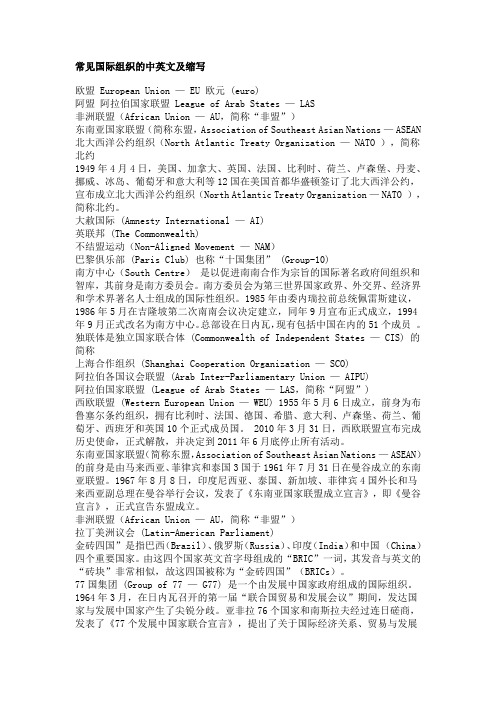
常见国际组织的中英文及缩写欧盟 European Union — EU 欧元 (euro)阿盟阿拉伯国家联盟 League of Arab States — LAS非洲联盟(African Union — AU,简称“非盟”)东南亚国家联盟(简称东盟,Association of Southeast Asian Nations —ASEAN 北大西洋公约组织(North Atlantic Treaty Organization — NATO ),简称北约1949年4月4日,美国、加拿大、英国、法国、比利时、荷兰、卢森堡、丹麦、挪威、冰岛、葡萄牙和意大利等12国在美国首都华盛顿签订了北大西洋公约,宣布成立北大西洋公约组织(North Atlantic Treaty Organization —NATO ),简称北约。
大赦国际 (Amnesty International — AI)英联邦 (The Commonwealth)不结盟运动(Non-Aligned Movement — NAM)巴黎俱乐部 (Paris Club) 也称“十国集团” (Group-10)南方中心(South Centre)是以促进南南合作为宗旨的国际著名政府间组织和智库,其前身是南方委员会。
南方委员会为第三世界国家政界、外交界、经济界和学术界著名人士组成的国际性组织。
1985年由委内瑞拉前总统佩雷斯建议,1986年5月在吉隆坡第二次南南会议决定建立,同年9月宣布正式成立,1994年9月正式改名为南方中心。
总部设在日内瓦,现有包括中国在内的51个成员。
独联体是独立国家联合体 (Commonwealth of Independent States — CIS) 的简称上海合作组织 (Shanghai Cooperation Organization — SCO)阿拉伯各国议会联盟 (Arab Inter-Parliamentary Union — AIPU)阿拉伯国家联盟 (League of Arab States — LAS,简称“阿盟”)西欧联盟 (Western European Union — WEU) 1955年5月6日成立,前身为布鲁塞尔条约组织,拥有比利时、法国、德国、希腊、意大利、卢森堡、荷兰、葡萄牙、西班牙和英国10个正式成员国。
英语专业四级考试听力资料-联合国主要机构名称
美洲国家核能委员会
Intergovernmental Bureau for Informatics
IBI
政府间信息局
Intergovernmental Committee for Migration
ICM
政府间移民委员会
Intergovernmental Copyright Committee
军事参谋团
Panel of Military Experts
军事专家小组
United Nations Military Observer
UNMO
联合国军事观察员
United Nations Peace-Keeping Force
联合国维和部队
United Nations Emergency Force
JINR
联合原子能研究所
Indian Ocean Rim Association for Regional Cooperation
环印度洋地区合作联盟
Inter-American Development Bank
IDB
泛美开发银行
Inter-American Nuclear Energy Commission
中非国家银行
Central African Monetary Union
中非货币同盟
Central American Bank of Economic Integration
中美洲经济一体化银行
Central American Common Market
CACM
中美洲共同市场
Commonwealth of Nations
UNCED
联合国环境与发展会议
United Nations Conference on Trade and Development
《关于国家和国际组织间或国际组织相互间条约法的维也纳公 约》

《关于国家和国际组织间或国际组织相互间条约法的维也纳公约》联合国条约法会议于1969年在维也纳举行,通过了一项决议,题为“关于《维也纳条约法公约》第1条的决议”,作为《最后文件》的附件。
该决议建议大会将关于国家和国际组织间或国际组织相互间条约问题交给委员会研究。
根据上述建议,大会1969年11月12日第2501(XXIV)号决议建议国际法委员会与主要国际组织共同协商研究这个问题。
在1970年第二十二届会议上,该委员会将这个问题列入其工作方案,并设立了一个小组委员会,负责审议关于该专题研究的初步问题。
委员会通过的该小组委员会的报告(A/CN.4/L.155)要求秘书处做某些筹备工作,特别是在联合国惯例方面,并请小组委员会主席向小组委员会成员提交一份关于这个专题的处理方法和范围的调查问卷。
1971年,在委员会第二十三届会议上,小组委员会向委员会提交了一份报告(A/CN.4/250),其中概述了小组委员会成员对小组委员会主席拟定的调查问卷的看法,并向委员会提出了若干建议,特别是建议任命一名关于这个专题的特别报告员,确认了向秘书长提出的关于做某些筹备工作的请求。
委员会审议并通过了该报告,未作改动。
在该届会议上,委员会任命保尔·路透为该专题的特别报告员。
委员会在1973年至1975年的第二十五届至第二十七届会议以及1977 年至 1982年的第二十九届至第三十四届会议上审议了这个专题。
关于这个专题的审议,委员会面前有特别报告员的报告(文件号见“文件”一节),各国政府及国际组织提供的信息(A/CN.4/339和Add.1-8;A/CN.4/350和Add.1-6,Add.6/Corr.1和Add.7-11)以及联合国秘书处编写的文件(A/CN.4/L.161和Add.1和2;A/CN.4/277和A/CN.4/281)。
1973年,在其第二十五届会议上,委员会请特别报告员在其前两份报告和该届会议期间提出的评论的基础上开始拟定一套条款草案。
联合国系统和联合国主要部门正式名称(02年10月)
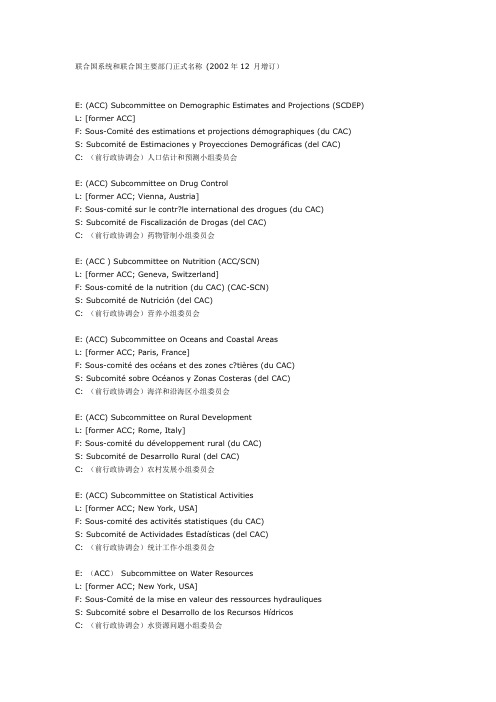
联合国系统和联合国主要部门正式名称(2002年12 月增订)E: (ACC) Subcommittee on Demographic Estimates and Projections (SCDEP) L: [former ACC]F: Sous-Comité des estimations et projections démographiques (du CAC) S: Subcomité de Estimaciones y Proyecciones Demográficas (del CAC)C: (前行政协调会)人口估计和预测小组委员会E: (ACC) Subcommittee on Drug ControlL: [former ACC; Vienna, Austria]F: Sous-comité sur le contr?le international des drogues (du CAC)S: Subcomité de Fiscalización de Drogas (del CAC)C: (前行政协调会)药物管制小组委员会E: (ACC ) Subcommittee on Nutrition (ACC/SCN)L: [former ACC; Geneva, Switzerland]F: Sous-comité de la nutrition (du CAC) (CAC-SCN)S: Subcomité de Nutrición (del CAC)C: (前行政协调会)营养小组委员会E: (ACC) Subcommittee on Oceans and Coastal AreasL: [former ACC; Paris, France]F: Sous-comité des océans et des zones c?tières (du CAC)S: Subcomité sobre Océanos y Zonas Costeras (del CAC)C: (前行政协调会)海洋和沿海区小组委员会E: (ACC) Subcommittee on Rural DevelopmentL: [former ACC; Rome, Italy]F: Sous-comité du développement rural (du CAC)S: Subcomité de Desarrollo Rural (del CAC)C: (前行政协调会)农村发展小组委员会E: (ACC) Subcommittee on Statistical ActivitiesL: [former ACC; New York, USA]F: Sous-comité des activités statistiques (du CAC)S: Subcomité de Actividades Estadísticas (del CAC)C: (前行政协调会)统计工作小组委员会E: (ACC)Subcommittee on Water ResourcesL: [former ACC; New York, USA]F: Sous-Comité de la mise en valeur des ressources hydrauliquesS: Subcomité sobre el Desarrollo de los Recursos HídricosC: (前行政协调会)水资源问题小组委员会E: Ad Hoc Inter-agency Meeting on WomenL: [New York, USA]F: Réunion spéciale interorganisations sur les femmesS: Reunión Interinstitucional ad hoc sobre la MujerC: 妇女问题机构间特别会议E: Advisory Committee on Administrative and Budgetary Questions (ACABQ)L: [New York, USA]F: Comité consultatif pour les questions administratives et budgétaires (CCQAB)S: Comisión Consultiva en Asuntos Administrativos y de Presupuesto (CCAAP)C: 行政和预算问题咨询委员会(行预咨委会)E: Commission on Population and DevelopmentF: Commission de la population et du développementS: Comisión de Población y DesarrolloC: 人口与发展委员会E: Commission for Social DevelopmentF: Commission du développement socialS: Comisión de Desarrollo SocialC: 社会发展委员会E: Commission on Sustainable Development (CSD)F: Commission du développement durable (CDD)S: Comisión sobre el Desarrollo SostenibleC: 可持续发展委员会E: Commission on the Status of Women (CSW)F: Commission de la condition de la femmeS: Comisión de la Condición Jurídica y Social de la MujerC: 妇女地位委员会E: Consultative Committee on Administrative Questions (Financial and Budgetary Questions) (CCAQ (FB))L: [Geneve, Switzerland]F: Comité consultatif pour les questions administratives (questions financières et budgétaires) (CCQA (FIN))S: ComitéConsultivo en Cuestiones Administrativas (Cuestiones Financieras y Presupuestarias) (CCCA (FP))C: 行政问题(财务和预算)协商委员会(行政协商会)E: Consultative Committee on Administrative Questions (Personnel and General Administrative Questions) (CCAQ (PER))L: [Geneva, Switzerland]F: Comitéconsultatif pour les questions administratives (questions de personnel et d'administration générale) (CCQA (PER))S: Comité Consultivo en Cuestiones Administrativas (Cuestiones de Personal y Cuestiones Administrativas Generales) (CCCA (PER))C: 行政问题(人事和一般行政问题)协商委员会E: Consultative Committee on Programme and Operational Questions (CCPOQ)L: [Geneva, Switzerland]F: Comité consultatif pour les questions relatives aux programmes et aux opérations (CCQPO) S: Comité Consultivo en Cuestiones de Programas y de Operaciones (CCCPO)C: 方案和业务问题协商委员会(方案业务协商会)E: Department for Disarmament Affairs (DDA)L: [UN, New York]F: Département des affaires de désarmementS: Departamento de Asuntos de DesarmeC: 裁军事务部(裁军部)E: Department of Economic and Social Affairs (DESA)L: [UN, New York]F: Département des affaires économiques et sociales (DAES)S: Departamento de Asuntos Económicos y Sociales (DAES)C: 经济和社会事务部(经社事务部)E: Department for General Assembly and Conference Management (DGACM)L: [formerly called: Department of General Assembly Affairs and Conference Services; ST/SGB/2002/11]F: Département de l'Assemblée générale et de la gestion des conférencesM: [anciennement appelé : Département des affaires de l'Assemblée générale et des services de conférence]S: Departamento de la Asamblea General y de Gestión de ConferenciasN: [anteriormente llamado: Departamento de Asuntos de la Asamblea General y de Servicios de Conferencias]C: 大会和会议管理部(大会部)P: [原称:大会事务和会议事务部(会议部)]E: Department of Management (DM)L: [UN, New York]F: Département de la gestion (DG)S: Departamento de Gestión (DG)C: 管理事务部(管理部)E: Department of Peacekeeping Operations (DPKO)F: Département des opérations de maintien de la paix (DOMP)S: Departamento de Operaciones de Mantenimiento de la PazI: [ST/SGB/2002/11]C: 维持和平行动部(维和部)E: Department of Political Affairs (DPA)L: [UN, New York]F: Département des affaires politiques (DAP)S: Departamento de Asuntos Políticos (DAP)C: 政治事务部(政治部)E: Department of Public Information (DPI)L: [UN, New York]F: Département de l'informationS: Departamento de Información Pública (DIP)C: 新闻部(新闻部)E: Economic Commission for Africa (ECA)L: [Addis Ababa, Ethiopia]F: Commission économique pour l'Afrique (CEA)S: Comisión Económica para áfrica (CEPA)C: 非洲经济委员会(非洲经委会)E: Economic Commission for Europe ((UN)ECE)L: [Geneva, Switzerland]F: Commission économique pour l'Europe (CEE(ONU))S: Comisión Económica para Europa (CEPE)C: 欧洲经济委员会(欧洲经委会)E: Economic Commission for Latin America and the Caribbean (ECLAC)L: [Santiago, Chile]F: Commission économique pour l'Amérique latine et les Cara?bes (CEPALC) S: Comisión Económica para América Latina y el Caribe (CEPAL)C: 拉丁美洲和加勒比经济委员会(拉加经委会)E: Economic and Social Commission for Asia and the Pacific (ESCAP)L: [Bangkok, Thailand]F: Commission économique et sociale pour l'Asie et le Pacifique (CESAP) S: Comisión Económica y Social para Asia y el Pacífico (CESPAP)C: 亚洲及太平洋经济社会委员会(亚太经社会)E: Economic and Social Commission for Western Asia (ESCWA)L: [Beirut, Lebanon]F: Commission économique et sociale pour l'Asie occidentale (CESAO)S: Comisión Económica y Social para Asia Occidental (CESPAO)C: 西亚经济社会委员会(西亚经社会)E: Executive Office of the Secretary-General (EOSG)L: [ST/SGB/2002/11]F: Cabinet du Secrétaire généralS: Oficina Ejecutiva del Secretario GeneralC: 秘书长办公厅E: Food and Agriculture Organization of the United Nations (FAO)L: [Rome, Italy]F: Organisation des Nations Unies pour l'alimentation et l'agriculture (FAO)S: Organización de las Naciones Unidas para la Agricultura y la Alimentación (FAO)C: 联合国粮食及农业组织(粮农组织)E: Global Programme on Globalization, Liberalization and Sustainable Human Development L: [UNCTAD/UNDP joint programme; A/56/6 (SECT.33), para. 74]F: Programme mondial relatif àla mondialisation, la libéralisation des échanges et le développement humain durableS: Programa mundial sobre globalización, liberalización y desarrollo humano sostenible C: 全球化、自由化和人类可持续发展全球方案E: High-level Committee on Management (HLCM)L: [United Nations System; Geneva, Switzerland]F: Comité de haut niveau sur la gestionS: Comité de Alto Nivel sobre GestiónC: 管理问题高级别委员会E: High-level Committee on Programmes (HLCP)L: [United Nations System; Geneva, Switzerland]F: Comité de haut niveau sur les programmesS: Comité de Alto Nivel sobre ProgramasC: 方案问题高级别委员会E: Information Systems Coordination Committee (ISCC)L: [Geneva, Switzerland]F: Comité de coordination des systèmes d'information (CCSI)S: Comité de Coordinación de los Sistemas de Información (CCSI)C: 信息系统协调委员会(信息系统协委会)E: Inter-Agency Committee on Sustainable Development (IACSD)L: [New York, USA]F: Comité interorganisations sur le développement durable (CIDD)S: Comité Interinstitucional sobre el Desarrollo SostenibleC: 机构间可持续发展委员会E: Inter-Agency Committee on Women and Gender Equality (IACWGE)L: [ACC; New York, USA]F: Comité interinstitutions sur les femmes et l'égalité entre les sexesS: Comité Interinstitucional sobre la Mujer y la Igualdad entre los Géneros (CIMIG)C: 妇女和两性平等机构间委员会(两性平等委员会)E: Inter-Agency Meeting on Language Arrangements, Documentation and Publications (IAMLADP)L: [New York, USA]F: Réunion interorganisations concernant les services linguistiques, la documentation et les publications (IAMLADP)S: Reunión entre organismos sobre disposiciones en materia de idiomas, documentación y publicaciones (IAMLADP)C: 语文安排、文件和出版物问题机构间会议(语文会议)E: Inter-Agency Procurement Services Office (IAPSO)L: [Copenhagen, Denmark]F: Bureau des services d'achats interorganisationsS: Oficina de Servicios Interinstitucionales de Adquisición (OSIA)C: 机构间采购事务处(采购处)E: Integrated Regional Information Networks (IRIN)L: [formerly: Integrated Regional Information Network (IRIN); new title adopted in January 2002; F established by P. Lonchampt; S established by terminologist;A/54/447]F: Réseaux régionaux d'information intégrés (IRIN)S: Redes regionales integradas de información (IRIN)C: 综合区域信息网E: International Atomic Energy Agency (IAEA)L: [Vienna, Austria]F: Agence internationale de l'énergie atomique (AIEA)S: Organismo Internacional de Energía Atómica (OIEA)C: 国际原子能机构(原子能机构)E: International Bank for Reconstruction and Development (IBRD)L : [World Bank; Washington, USA]F: Banque internationale pour la reconstruction et le développement (BIRD)S: Banco Internacional de Reconstrucción y Fomento (BIRF)C: 国际复兴开发银行(世界银行;世行)E: International Bureau of Education (IBE)L: [UNESCO; Geneva, Switzerland]F: Bureau international d'éducation (BIE)S: Oficina Internacional de Educación (OIE)C: 国际教育局E: International Centre for Science and High Technology (ICS)L: [Trieste, Italy]F: Centre international pour la science et la technologie de pointe (CIS) S: Centro Internacional de Ciencia y Tecnología Avanzada (CIC)C: 国际科学和高技术中心(科技中心)E: International Civil Aviation Organization (ICAO)L: [Montreal, Canada]F: Organisation de l'aviation civile internationale (OACI)S: Organización de Aviación Civil Internacional (OACI)C: 国际民用航空组织(民航组织)E: International Civil Service Commission (ICSC)L: [New York, USA]F: Commission de la fonction publique internationale (CFPI)S: Comisión de Administración Pública Internacional (CAPI)C: 国际公务员制度委员会E: International Computing Centre (ICC)L: [Geneva, Switzerland]F: Centre international de calcul (CIC)S: Centro Internacional de Cálculos Electrónicos (CICE)C: 国际计算中心E: International Court of Justice (ICJ)L: [The Hague, The Netherlands]F: Cour internationale de Justice (CIJ)S: Corte Internacional de Justicia (CIJ)C: 国际法院E: International Tribunal for RwandaL: [ Arusha, T anzania]F: Tribunal international pour le RwandaS: Tribunal Internacional para RwandaC: 卢旺达问题国际法庭E: International Criminal Tribunal for the Former Yugoslavia (ICTY)L: [The Hague, The Netherlands]F: Tribunal pénal international pour l'ex-YougoslavieS: Tribunal Penal Internacional para la ex YugoslaviaC: 前南斯拉夫问题国际刑事法庭E : International Development Association (IDA)L : [World Bank; Washington, USA]F : Association internationale de développement (IDA)S : Asociación Internacional de Fomento (AIF)C: 国际开发协会E: International Finance Corporation (IFC)L : [World Bank; Washington, USA]F: Société financière internationale (SFI)S: Corporación Financiera Internacional (CFI)C: 国际金融公司(金融公司)E: International Fund for Agricultural Development (IFAD) L: [Rome, Italy]F: Fonds international de développement agricole (FIDA) S: Fondo Internacional de Desarrollo Agrícola (FIDA)C: 国际农业发展基金会(农发基金)E: International Institute on Ageing (INIA)L: [Valetta, Malta]F: Institut international du vieillissement (INIA)S: Instituto Internacional sobre el EnvejecimientoC: 国际老龄问题研究所E: International Labour Organization (ILO)L: [Geneva, Switzerland]F: Organisation internationale du Travail (OIT)S: Organización Internacional del Trabajo (OIT)C: 国际劳工组织(劳工组织)E: International Maritime Organization (IMO)L: [London, UK]F: Organisation maritime internationale (OMI)S: Organización Marítima Internacional (OMI)C: 国际海事组织(海事组织)E: International Monetary Fund (IMF)L: [Washington, USA]F: Fonds monétaire international (FMI)S: Fondo Monetario Internacional (FMI)C: 国际货币基金组织(货币基金组织)E: International Research and Training Institute for the Advancement of Women (INSTRAW) L: [Santo Domingo, Dominican Republic]F: Institut international de recherche et de formation pour la promotion de la femme (INSTRAW)S: Instituto Internacional de Investigaciones y Capacitación para la Promoción de la Mujer (INSTRAW)C: 提高妇女地位国际研究训练所(提高妇女地位研训所)E: International Telecommunication Union (ITU)L: [Geneva, Switzerland]F: Union internationale des télécommunications (UIT)S: Unión Internacional de Telecomunicaciones (UITC: 国际电信联盟(电联)E: International Trade Centre UNCTAD/WTO (ITC)L: [Geneva, Switzerland]F: Centre du commerce international CNUCED/OMC (CCI)S: Centro de Comercio Internacional UNCTAD/OMC (CCI)C: 贸发会议/世贸组织国际贸易中心(贸易中心)E: International Training Centre of the ILOL: [Turin, Italy)]F: Centre international de formation de l'OITS: Centro Internacional de Formación de la OITC: 劳工组织国际培训中心E: Joint Inspection Unit (JIU)L: [Geneva, Switzerland]F: Corps commun d'inspection (CCI)S: Dependencia Común de Inspección (DCI)C: 联合检查组(联检组)E: Joint Inter-agency Meeting on Computer-assisted Translation and Terminology (JIAMCATT) L: [Geneva, Switzerland]F: Réunion interinstitutions sur la terminologie et la traduction assistée par ordinateur (JIAMCATT)S: Reunión interorganismos sobre terminología y traducción con soporte informático (JIAMCATT)C: 计算机辅助翻译和术语问题机构间联席会议E: Joint United Nations Information Committee (JUNIC)L: [New York, USA]F: Comité commun de l'information des Nations Unies (CCINU)S: Comité Mixto de Información de las Naciones Unidas (CMINU)C: 联合国新闻事务联合委员会(新闻联委会)E: Joint United Nations Programme on HIV/AIDS (UNAIDS)F: Programme commun des Nations Unies sur le sida (ONUSIDA)S: Programa conjunto de las Naciones Unidas sobre el SIDA (ONUSIDA)C: 联合国艾滋病毒/艾滋病联合方案(艾滋病方案)E: Management Ownership Committee (MOC)L: [composed of the heads of all Geneva-based specialized agencies, the United Nations Office at Geneva and United Nations programmes, as well as of the World Trade Organization and the International Trade Centre, under the chairmanship of the Director-General of the United Nations Office at Geneva]F: Comité interinstitutions de gestion des services communs (CIGSC)M: [mandat: A/56/417/Rev.1, chap. IV; traduction fran?aise retenue par New York, courriel du 28.03.02]C: 管理所有权委员会E : Media and Peace InstituteL : [established by the University for Peace in 2001; A/56/349, para. 44]F: Institut des médias et de la paixS: Instituto de los Medios de Comunicación y la PazC: 媒体与和平学院E: Military Staff Committee (MSC)L: [Security Council]F: Comité d'état-majorS: Comité de Estado MayorC: 军事参谋团(军参团)E: Multilateral Investment Guarantee Agency (MIGA)L: [Washington, USA]F: Agence multilatérale de garantie des investissements (AMGI)S: Organismo Multilateral de Garantía de Inversiones (OMGI)C: 多边投资担保机构(担保机构)E: Office for Drug Control and Crime Prevention (ODCCP)L: [Vienna, Austria]F: Bureau du contr?le des drogues et de la prévention du crime (BCDPC)S: Oficina de Fiscalización de Drogas y de Prevención del Delito (OFDPD)C: 药物管制和预防犯罪办事处E: Office for Outer Space Affairs (OOSA)L: [Vienna, Austria]F: Bureau des affaires spatiales (OOSA)S: Oficina de Asuntos del Espacio UltraterrestreC: 外层空间事务厅E: Office for the Coordination of Humanitarian Affairs (OCHA)F: Bureau de la coordination des affaires humanitairesS: Oficina de Coordinación de Asuntos Humanitarios (OCAH)C: 人道主义事务协调厅E: Office of Central Support Services (OCSS )L: [ST/SGB/2002/11]F: Bureau des services centraux d'appuiS: Oficina de Servicios Centrales de ApoyoC: 中央支助事务厅E: Office of Human Resources Management (OHRM)L: [ST/SGB/2002/11]F: Bureau de la gestion des ressources humainesS: Oficina de Gestión de Recursos HumanosC: 人力资源管理厅(人力厅)E: Office of Internal Oversight Services (OIOS)L: [New York, USA]F: Bureau des services de contr?le interne (BSCI)S: Oficina de Servicios de Supervisión Interna (OSSI)C: 内部监督事务厅(监督厅)E: Office of Legal Affairs (OLA)F: Bureau des affaires juridiquesS: Oficina de Asuntos Jurídicos (OAJ)C: 法律事务厅E: Office of Programme Planning, Budget and Accounts (OPPBA)L: [ST/SGB/2002/11]F: Bureau de la planification des programmes, du budget et de la comptabilitéS: Oficina de Planificación de Programas, Presupuesto y Contaduría GeneralC: 方案规划、预算和帐务厅(帐务厅)E: Office of the High Representative for the Least Developed Countries, Landlocked Developing Countries and Small Island Developing States (OHRLLS)F: Bureau du Haut Représentant pour les pays les moins avancés, les pays en développement sans littoral et les petits états insulaires en développementS: Oficina del Alto Representante para los Países Menos Adelantados, los Países en Desarrollo sin Litoral y los Peque?os Estados Insulares en DesarrolloI: [ST/SGB/2002/11; in New York replaces the Office of Special Coordinator for the LeastDeveloped, Landlocked and Island Developing Countries] [A/56/645, para. 20]]C: 最不发达国家、内陆发展中国家和小岛屿发展中国家高级代表办事处E: Office of the Iraq Programme (OIP)L: [ST/SGB/2002/11]F: Bureau chargé du Programme IraqS: Oficina del Programa para el IraqC: 伊拉克方案办公室(伊办)E: Office of the United Nations High Commissioner for Human Rights(OHCHR)L: [Geneva, Switzerland]F: Haut-Commissariat aux droits de l'homme (HCDH)S: Oficina del Alto Comisionado de las Naciones Unidas para los Derechos Humanos (ACNUDH) C: 联合国人权事务高级专员办事处(人权高专办)E: Office of the United Nations High Commissioner for Refugees (UNHCR)L: [Geneva, Switzerland]F: Haut-Commissariat des Nations Unies pour les réfugiés (HCR)S: Oficina del Alto Comisionado de las Naciones Unidas para los Refugiados (ACNUR)C: 联合国难民事务高级专员办事处(难民署)E: Office of the United Nations Security Coordinator (UNSECOORD)F: Bureau du Coordonnateur des Nations Unies pour les mesures de sécuritéS: Oficina del Coordinador de Asuntos de Seguridad de las Naciones UnidasC: 联合国安全协调员办公室(安协办)E: Office of the United Nations Special Coordinator in the Occupied Territories - (Gaza) (UNSCO)F: Bureau du Coordonnateur spécial des Nations Unies dans les territoires occupés - (Gaza) S: Oficina del Coordinador Especial de las Naciones Unidas en los Territorios Ocupados - (Gaza) (CENUO)C: 联合国驻被占领土特别协调员办事处E: Office on Drugs and CrimeL: [formerly called: Office for Drug Control and Crime Prevention (ODCCP)]F: Office contre la drogue et le crimeS: Oficina contra la Droga y el DelitoI: [ST/SGB/2002/11; Vintars, 25.11.02]C: 药物和犯罪问题办事处E: Organizational Committee (OC)L: [former ACC; New York, USA]F: Comité d'organisationS: Comité de OrganizaciónC: 组织委员会E: Panel of External Auditors of the United Nations, the Specialized Agencies and the International Atomic Energy AgencyL: [New York, USA]F: Groupe des vérificateurs extérieurs des comptes de l'Organisation des Nations Unies, des institutions spécialisées et de l'Agence internationale de l'énergie atomiqueS: Grupo de Auditores Externos de las Naciones Unidas, los organismos especializados y el Organismo Internacional de Energía AtómicaC: 联合国、各专门机构和国际原子能机构外聘审计团E: Secretariat of the Convention to Combat Desertification (UNCCD or CCD)L: [Bonn; Germany]F: Secrétariat de la Convention sur la lutte contre la désertificationS: Secretaría de la Convención de Lucha contra la Desertificación (CLD)C: 防治荒漠化公约秘书处E: Secretariat of the United Nations Framework Convention on Climate Change (UNFCCC) L: [Bonn, Germany]F: Secrétariat de la Convention cadre des Nations Unies sur les changements climatiques (CCNUCC)S: Secretaría de la Convención Marco de las Naciones Unidas sobre el Cambio Climático (CMNUCC)C: 联合国气候变化框架公约(气候公约)秘书处E: Statistical CommissionF: Commission de statistiqueS: Comisión de Estadística.C: 统计委员会E: United Nations (UN)L: [New York, USA; the acronym UNO is not used]F: Organisation des Nations Unies (ONU)S: Naciones UnidasC: 联合国E: United Nations Board of AuditorsL: [New York, USA]F: Comité des commissaires aux comptes de l'ONUS: Junta de Auditores de las Naciones UnidasC: 联合国审计委员会E: United Nations Children's Fund (UNICEF)L: [New York, USA]F: Fonds des Nations Unies pour l'enfance (UNICEF)S: Fondo de las Naciones Unidas para la Infancia (UNICEF)C: 联合国儿童基金会(儿童基金会)E: United Nations Commission on International Trade Law (UNCITRAL)L: [Vienna, Austria]F: Commission des Nations Unies pour le droit commercial international (CNUDCI)S: Comisión de las Naciones Unidas para el Derecho Mercantil Internacional (CNUDMI) C: 联合国国际贸易法委员会(贸易法委员会)E: United Nations Common Supplier Database (UNCSD)F: Base de données communes des Nations Unies sur les fournisseursS: Base común de datos de proveedores de las Naciones UnidasC: 联合国供应商共同数据库E: United Nations Communications GroupL: [formerly called: Joint United Nations Information Committee (JUNIC)]F: Groupe de la communication des Nations UniesM: [anciennement appelé : Comité commun de l'information des Nations Unies (CCINU)] I: [Source : A/AC.198/2002/7, 14.02.02]C: 联合国宣传小组P: [原称:联合国新闻事务联合委员会(新闻联委会)]E: United Nations Compensation Commission (UNCC)L: [Geneva, Switzerland]F: Commission d'indemnisation des Nations Unies (CINU)S: Comisión de Indemnización de las Naciones Unidas (CINU)C: 联合国赔偿委员会(赔委会)E: United Nations Conference on Trade and Development (UNCTAD)L: [Geneva, Switzerland]F: Conférence des Nations Unies sur le commerce et le développement (CNUCED)S: Conferencia de las Naciones Unidas sobre Comercio y Desarrollo (UNCTAD)C: 联合国贸易和发展会议(贸发会议)E: United Nations CyberSchoolBusF: bus magique des Nations UniesS: (el) CyberSchoolBusC: 联合国“网络校车”E: United Nations Development Fund for Women (UNIFEM)L: [New York, USA]F: Fonds de développement des Nations Unies pour la femme (UNIFEM)S: Fondo de Desarrollo de las Naciones Unidas para la Mujer (UNIFEM)C: 联合国妇女发展基金(妇发基金)E: United Nations Development Programme (UNDP)L: [New York, USA]F: Programme des Nations Unies pour le développement (PNUD)S: Programa de las Naciones Unidas para el Desarrollo (PNUD)C: 联合国开发计划署(开发计划署)E: United Nations Educational, Scientific and Cultural Organization. (UNESCO)L: [Paris, France]F: Organisation des Nations Unies pour l'éducation, la science et la culture (UNESCO)S: Organización de las Naciones Unidas para la Educación, la Ciencia y la Cultura (UNESCO) C: 联合国教育、科学及文化组织(教科文组织)E: United Nations Environment Programme (UNEP)L: [Nairobi, Kenya]F: Programme des Nations Unies pour l'environnement (PNUE)S: Programa de las Naciones Unidas para el Medio Ambiente (PNUMA)C: 联合国环境规划署(环境规划署)E: United Nations Headquarters (UNHQ)L: [New York, USA]F: Siège de l'Organisation des Nations UniesS: Sede de las Naciones UnidasC: 联合国总部E: United Nations Human Settlements Programme (UN-Habitat)L: [formerly called: United Nations Centre for Human Settlements (UNCHS) (Habitat);A/RES/56/206 of 21 December 2001; A/56/565; new structure and title effective as from 1st January 2002; /sg/rs.htm]F: Programme des Nations Unies pour les établissements humains (ONU-Habitat)M : [appelé jusqu'au 31.12.01: Centre des Nations Unies pour les établissements humains (CNUEH) (Habitat)]S : Programa de las Naciones Unidas para los Asentamientos Humanos (ONU-Hábitat)N: [antes llamado: Centro de las Naciones Unidas para los Asentamientos Humanos (CNUAH) (ONU-Hábitat)]C: 联合国人类住区规划署(联合国人居署)P: [原称:联合国人类住区(生境)中心(生境中心)]E: United Nations Information and Communication Technologies T ask Force (UNICT TF)L: [A/56/559]F: Groupe d'étude de l'Organisation des Nations Unies sur les technologies de l'information et de la communicationS: Equipo de T areas sobre tecnologías de la información y las comunicaciones de las Naciones UnidasC: 联合国信息和通信技术工作队E: United Nations Industrial Development Organization (UNIDO)L: [Vienna, Austria]F: Organisation des Nations Unies pour le développement industriel (ONUDI)S: Organización de las Naciones Unidas para el Desarrollo Industrial (ONUDI)C: 联合国工业发展组织(工发组织)E: United Nations Institute for Disarmament Research (UNIDIR)L: [Geneva, Switzerland]F: Institut des Nations Unies pour la recherche sur le désarmement (UNIDIR)S: Instituto de las Naciones Unidas de Investigación sobre el Desarme (UNIDIR)C: 联合国裁军研究所(裁研所)E: United Nations Institute for Training and Research (UNITAR)L: [Geneva, Switzerland]F: Institut des Nations Unies pour la formation et la recherche (UNITAR)S: Instituto de las Naciones Unidas para Formación Profesional e Investigaciones (UNITAR) C: 联合国训练研究所(训研所)E: United Nations International Drug Control Programme (UNDCP)L: [Vienna, Austria]F: Programme des Nations Unies pour le contr?le international des drogues (PNUCID)S: Programa de las Naciones Unidas para la Fiscalización Internacional de Drogas (PNUFID) C: 联合国国际药物管制规划署(药物管制署)E: United Nations International School (UNIS)L: [New York, USA]F: école internationale des Nations Unies (UNIS)S: Escuela Internacional de las Naciones Unidas (UNIS)C: 联合国国际学校(国际学校)E: United Nations Interregional Crime and Justice Research Institute (UNICRI)L: [Rome, Italy]F: Institut interrégional de recherche des Nations Unies sur la criminalité et la justice (UNICRI) S: Instituto Interregional de las Naciones Unidas para Investigaciones sobre la Delincuencia y la JusticiaC: 联合国区域间犯罪和司法研究所(犯罪司法所)E: (United Nations) Joint Staff Pension Fund ((UN)JSPF)L: [New York, USA]F: Caisse commune des pensions du personnel (des Nations Unies) (CCPP(NU))。
联合国组织结构图

DPI Department of Public Information DM Department of Management UN-OHRLLS Office of the High
Representative for the Least
Developed Countries, Landlocked
Security Council
General Assembly
Subsidiary Bodies
Main committees Human Rights Council Other sessional committees Standing committees and ad hoc bodies Other subsidiary organs
UNIDIR2 United Nations Institute for
Disarmament Research
International Research and Training Institute for the Advancement of Women
IMF International Monetary Fund ICAO International ivil Aviation
DPKO Department of Peacekeeping
Operations
Regional Commissions
Economic Commission for Africa (ECA) Economic Commission for Europe (ECE) Economic Commission for Latin America and the Caribbean (ECLAC) Economic and Social Commission for Asia and the Pacific (ESCAP) Economic and Social Commission for Western Asia (ESCWA)
妇女节英文介绍
★英语资源频道为⼤家整理的妇⼥节英⽂介绍,供⼤家参考。
更多阅读请查看本站频道。
International Women's Day (8 March) is an occasion marked by women's groups around the world. This date is also commemorated at the United Nations and is designated in many countries as a national holiday. When women on all continents, often divided by national boundaries and by ethnic, linguistic, cultural, economic and political differences, come together to celebrate their Day, they can look back to a tradition that represents at least nine decades of struggle for equality, justice, peace and development.转载⾃:考试⼤ - [] International Women's Day is the story of ordinary women as makers of history; it is rooted in the centuries-old struggle of women to participate in society on an equal footing with men. In ancient Greece, Lysistrata initiated a sexual strike against men in order to end war; during the French Revolution, Parisian women calling for "liberty, equality, fraternity" marched on Versailles to demand women's suffrage. The idea of an International Women's Day first arose at the turn of the century, which in the industrialized world was a period of expansion and turbulence, booming population growth and radical ideologies. Following is a brief chronology of the most important events: 1909 In accordance with a declaration by the Socialist Party of America, the first National Woman's Day was observed across the United States on 28 February. Women continued to celebrate it on the last Sunday of that month through 1913. 1910 The Socialist International, meeting in Copenhagen, established a Women's Day, international in character, to honour the movement for women's rights and to assist in achieving universal suffrage for women. The proposal was greeted with unanimous approval by the conference of over 100 women from 17 countries, which included the first three women elected to the Finnish parliament. No fixed date was selected for the observance. 1911 As a result of the decision taken at Copenhagen the previous year, International Women's Day was marked for the first time (19 March) in Austria, Denmark, Germany and Switzerland, where more than one million women and men attended rallies. In addition to the right to vote and to hold public office, they demanded the right to work, to vocational training and to an end to discrimination on the job. Less than a week later, on 25 March, the tragic Triangle Fire in New York City took the lives of more than 140 working girls, most of them Italian and Jewish immigrants. This event had a significant impact on labour legislation in the United States, and the working conditions leading up to the disaster were invoked during subsequent observances of International Women's Day. 1913-1914 As part of the peace movement brewing on the eve of World War I, Russian women observed their first International Women's Day on the last Sunday in February 1913. Elsewhere in Europe, on or around 8 March of the following year, women held rallies either to protest the war or to express solidarity with their sisters. 1917 With 2 million Russian soldiers dead in the war, Russian women again chose the last Sunday in February to strike for "bread and peace". Political leaders opposed the timing of the strike, but the women went on anyway. The rest is history: Four days later the Czar was forced to abdicate and the provisional Government granted women the right to vote. That historic Sunday fell on 23 February on the Julian calendar then in use in Russia, but on 8 March on the Gregorian calendar in use elsewhere.来源: Since those early years, International Women's Day has assumed a new global dimension for women in developed and developing countries alike. The growing international women's movement, which has been strengthened by four global United Nations women's conferences, has helped make the commemoration a rallying point for coordinated efforts to demand women's rights and participation in the political and economic process. Increasingly, International Women's Day is a time to reflect on progress made, to call for change and to celebrate acts of courage and determination by ordinary women who have played an extraordinary role in the history of women's rights. The Role of the United Nations Few causes promoted by the United Nations have generated more intense and widespread support than the campaign to promote and protect the equal rights of women. The Charter of the United Nations, signed in San Francisco in 1945, was the first international agreement to proclaim gender equality as a fundamental human right. Since then, the Organization has helped create a historic legacy of internationally agreed strategies, standards, programmes and goals to advance the status of women worldwide. Over the years, United Nations action for the advancement of women has taken four clear directions: promotion of legal measures; mobilization of public opinion and international action; training and research, including the compilation of gender desegregated statistics; and direct assistance to disadvantaged groups. Today a central organizing principle of the work of the United Nations is that no enduring solution to society's most threatening social, economic and political problems can be found without the full participation, and the full empowerment, of the world's women.。
- 1、下载文档前请自行甄别文档内容的完整性,平台不提供额外的编辑、内容补充、找答案等附加服务。
- 2、"仅部分预览"的文档,不可在线预览部分如存在完整性等问题,可反馈申请退款(可完整预览的文档不适用该条件!)。
- 3、如文档侵犯您的权益,请联系客服反馈,我们会尽快为您处理(人工客服工作时间:9:00-18:30)。
P.O. Box 400, A-1400 Vienna Austria Or e-mail to: unwomens@
(请务必在申请表的第 9 页上签字和盖章)
3. 组织名称:
地址:
电话:
移动电话: (包括国家区号):
传真:
电子邮箱:
联系人 (所有的邮件和信件均将传递给此人):
姓名:
职务:
电子邮箱:
电话:
4. 你们通过何种渠道获得关于联合国妇女协会的信息?
联合国妇女协会/联合国代表
互联网
其他渠道:(请说明)
朋友/同事
5. 你们在联合国是否有联系人?如有,请填写该联系人的相关信息:
但获得资助的组织必须在项目完成后向联合国妇女协会提供完整的项目报告及财务报表。 z 联合国妇女协会不提供资助给项目中所包含的费用如工资、税金、租金、交通费、
意识培训、营运和管理费。 z 申请人请务必在 2010 年 3 月 1 日之前提交申请。 z 请完整填写申请表中的所有信息。如有可能,请尽量提供英文翻译件。 z 申请人必须提供政府颁发的注册证书复印件。 z 请尽量使用电脑或打字机填写申请表。手工填写请务必清晰工整。 z 请在申请表上签字、盖章后邮寄到以下地址:
具体日期:
8. 贵组织是否在政府部门登记注册?
(如果是,请附上相关文件)
8a. 贵组织是否为非政府组织?
是
否
是
否
9. 请依照由近及远的时间顺序列明过去 5 年内贵组织开展的活动或执行的项目:
项目名称
资助机构
资助金额 项目完成时间
10.联合国妇女协会是否资助过贵组织的有关项目?
11.项目何时得到过资助?
14. 贵组织雇佣多少员工?
数量
(请注明该雇员的身份,本地员工,外来人员, 外籍雇员)
15. 贵组织拥有多少义工?
数量
(请注明该雇员的身份,本地员工,外来人员, 外籍雇员)
16. 贵组织的年度预算
欧元
美元
(请注明货币单位,欧元或美元)
年度预算中的行政支出费用
欧元
美元
年度预算中的项目及活动的支出费用 欧元
资金来源
获得资助部分的名称
是
否
是
否
金额(欧元或美元)
账户资料
32. 如果该项目获得资助,请说明贵组织所希望支付的货币?
美元 33. 请填写以下的银行信息 银行名称 银行地址
欧元
帐户名称 帐号 国际银行帐号既 IBAN 号码 快电码既 SWIFT 代码
UNWG Charity Application 2010Chinese
电子邮箱: unwomens@ 网址: /unwg 接受捐款账户: Bank Austria (BLZ 12000) 690001300
联合国妇女协会慈善基金申请表 2010 年
申请提交截至日期:2010 年 3 月 1 日
z 项目必须针对 15 周岁以下的儿童或 21 周岁以下的残疾人。 z 针对母亲和孩子的项目。 z 项目必须毫无歧视地惠及所有的儿童。 z 仅限于帮助个别儿童的项目将不予考虑。 z 联合国妇女协会可以向每个获得批准的项目提供最高 7000 欧元(或等值美金)的资助,
女士/先生
联合国内的地址:
家庭地址(如若没有联合国内的地址):
电话:
移动电话:
传真:
电子邮箱:
6. 贵组织的目标和宗旨? (如果需要,可以另附具体说明或是提供贵组织的手册或/和网址等来帮助说明)
UNWG Charity Application 2010Chinese
Page 2 of 9
7. 贵组织的成立时间?
签字_____________________________ 日期 __________________________
( ___________________________________________________) 负责人姓名(打印)
UNWG Charity Application 2010Chinese
项目名称
费用(欧元或美元)
(注意: 联合国妇女协会将在 2010 年 12 月初向获得批准的项目提供资助.) UNWG Charity Application 2010Chinese
Page 7 of 9
30. 贵组织是否已向其他的组织申请过资助?
31. 是否已经获得资助或承诺?
31a.如果是,请说明资金的来源,具体的资助项目和金额。
(To be completed by UNWG: Date received:_________________ Received by: ____________________)
UNWG Charity Application 2010Chinese
Page 1 of 9
1. 项目名称:
2. 国家 (项目所在地):
美元
17.贵组织稳定的收入来源是什么?(请注明百分比)
资金来源
会费
自筹资金
政府资助
国际组织的资助
其它(请列明)
总计
18. 向联合国妇女协会申请资助的项目内容: (请附上相关的介绍,文件和照片)
% % % % % 100%
19. 请说明该项目将解决的问题?
UNWG Charity Application 2010Chinese
Page 8 of 9
34. 本申请的准备和提交人: 组织负责人姓名(请打印) 组织负责人姓名签字
签字日期 单位印鉴
授权书
本组织, ___________________________________________________________________, (组织名称)
兹授权联合国妇女协会为展览、宣传、出版或任何其它活动形式之目的 使用与本项目有关的任何信息,幻灯片或图片。
Page 9 of 9
时间年份:
年
年
12.是否已向联合国妇女协会提交了完整的项目报告?
已经提交了完整的报告
联合国妇女协会基金使用情况的财务报告(或收据)
该项目是否成功执行完毕
13. 如果该项目未能完成,请简要叙述理由。
是
否
年
是 是 是
年
否 否 否
UNWGห้องสมุดไป่ตู้Charity Application 2010Chinese
Page 3 of 9
United Nations Women’s Guild Vienna 联合国维也纳妇女协会
地址:Vienna International Center Room F-1036 P.O.Box 400, A-1400 Vienna, Austria 电话: (+43 1) 2600-24276, 26026-4284
日期:
23. 预计项目完成所需要的时间
24. 从项目中受益的儿童数量
女孩
25. 受益儿童年龄
女孩
26. 请列明受益儿童的类型
性侵犯受害者
残疾儿童(请列明类型)
灾难受害者(请列明)
极度贫困儿童
教育权受限制儿童
孤儿
严重病患儿童,如艾滋病(请列明)
其它原因:(请列明)
月 男孩 男孩
是 是 是 是 是 是 是
年
否 否 否 否 否 否 否
UNWG Charity Application 2010Chinese
Page 6 of 9
27. 项目预计费用 (以欧元或美元计算 欧元
美元
的费用预计)
28. 申请资助金额 (以欧元或美元计算 欧元
美元
的费用预计)
29. 请列明需要资助的项目名称及相应费用(附上费用支出明细,如报价单、发票等)
Page 4 of 9
20. 该项目的目标是什么? 长期目标:
近期目标:
21. 项目规划: 请按照年月的顺序列明贵组织执行该项目的具体步骤:(如需要请另纸说明)
UNWG Charity Application 2010Chinese
Page 5 of 9
项目规划 (继 续):
22. 项目预计开始执行时间
